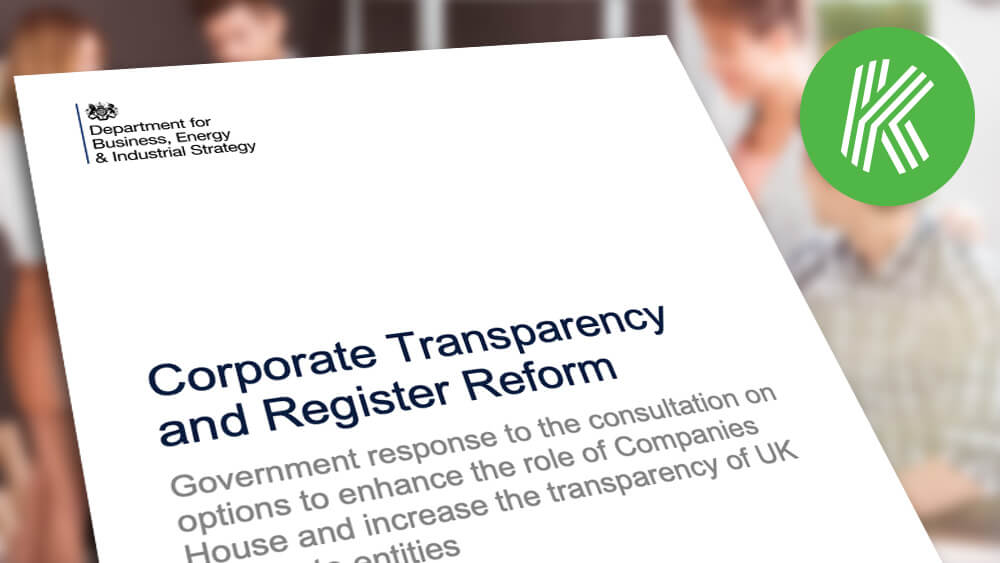
Published: 19 August 2020 1:43 pm Author: Oliver Stanley
Government publishes its response to consultation on Corporate Transparency and Register Reform
A consultation was run May – August 2019 on proposals to reform the principles and processes underpinning the operation of company and corporate management, overseen by Companies House.
The Government has now published its response, proposing a wide range of changes. – some of the most significant for over a hundred years. They have set a ‘clear direction of travel’ where technology and third parties are going to play crucial roles. They hope to implement some of these changes in the early part of 2021.
In summary:
Identity verification
- Identity verification will be required for directors and People with Significant Control (PSCs). This is likely to be achieved digitally, with options for non-digital verification.
- An individual will only need to be verified once – essentially once they have an ‘account’ with Companies House, that can be used to meet future verification requirements.
- Identity verification of shareholders will continue not to be required.
- Verification will be required before certain processes or filings can be submitted to Companies House – e.g. new incorporations or director appointments.
- Identity verification will be used to link stakeholders in Companies House.
- A requirement for verification will apply retrospectively – to the approx 10milliion existing directors & PSCs.
- Third parties submitting information on a company’s behalf will need to be verified (as an individual or organisation).
- Where third parties are involved, there should be no need for ‘double verification’ – if the third party has done it already to the required standard (e.g. as part of AML checks).
We applaud the aims of these changes, that the Government recognises that these measures cannot disproportionately disrupt business continuity, and that technology will be used to make these changes as seamless as possible. This is great to hear, but it’s a massive undertaking that is proposed, and we hope that it will work as intended. Particularly for the existing 10 million…
We also wait to see how they plan to monitor/regulate verification by third parties.
Query validity/accuracy of information submitted
- Companies House will have the power to query information that is filed by companies and require explanation/supporting evidence if necessary.
- This will give Companies House oversight of the substantive content of information provided by companies.
- Further consultation will be carried out to help define the legal basis and scope of this power.
This is another area that we believe to have the correct intentions. From a point of principle, the UK’s public register should be accurate and transparent, reflecting the nature of doing business in the UK. From a practical perspective, we also welcome the indications that any queries will be raised and resolvable digitally.
The question of legality and scope remains to be answered. It has long been the case that a company should be free to operate within the confines of the law – both substantively and procedurally. We can understand the reservations of many that Companies House may potentially second-guess the content, accuracy or rationale of certain information that company is required to provide.
Company accounts validity/accuracy of information submitted
- Proceed with work to allow digital submission of all company accounts, using iXBRL tagging (a way of tagging financial information so it can be read by a computer, and therefore analysed, aggregated, etc.)
- Restrict a company’s ability to shorten its accounting reference period (i.e. bring forward the accounting reference date) to no more than once every 5 years.
We welcome steps to prevent abuse, provided that honest users are not unduly prejudiced. Allowing digital submission of all information and tagging where necessary are welcomed. Nothing is more irritating than being able to analyse some data automatically, but then visually decipher other!
Protect Personal information
- Implement changes to remove redundant requirements for certain personal data (e.g. director occupations), and suppress this information if already on the register.
- Allow individuals to request certain information be suppressed from the public register (e.g. date of birth, signatures, etc).
This is another area that we believe to have the correct intentions. Redundancy should be removed wherever possible and if there is no benefit in showing private information, it should be suppressed.
Kudocs’ comments
In general, we welcome the Government’s response. In particular, its recognition of the need to modernise and take a practical approach to this vitally important part of corporate governance. The use of technology, and third parties, will be vital and we hope there is no ‘re-inventing the wheel’ when there are so many existing solutions available.
Identity verification will, we believe, have the greatest impact on companies, and Kudocs will implement changes to support these requirements. Technology can be used to provide a far easier and more secure system than currently in place.
These changes are due to start being implemented in the early part of 2021. Given the scope and nature of the work required, this is an admirable (!) deadline to aim for and we hope it can be met.
Kudocs will continue to monitor and update on changes as they happen, and will support its customers as when any changes are made.